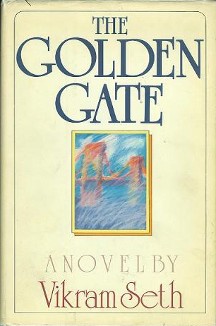The Golden Gate (Seth novel)

First edition
|
|
| Author | Vikram Seth |
|---|---|
| Country | United States |
| Language | English |
| Publisher | Random House |
|
Publication date
|
March 12, 1986 |
| Media type | Print (Hardcover) |
| Pages | 307 pp |
| ISBN | |
| OCLC | 12081140 |
| 813/.54 19 | |
| LC Class | PR9499.3.S38 G65 1986 |
The Golden Gate (1986) is the first novel by poet and novelist Vikram Seth. The work is a novel in verse composed of 590 Onegin stanzas (sonnets written in iambic tetrameter, with the rhyme scheme following the ababccddeffegg pattern of Eugene Onegin). It was inspired by Charles Johnston's translation of Pushkin's Eugene Onegin.
Set in the 1980s, The Golden Gate follows a group of yuppies in San Francisco. The inciting action occurs when protagonist John Brown has his friend Janet Hayakawa place an amorous advertisement of himself in the newspaper; the latter answered, at length, by trial-lawyer Elisabeth ('Liz') Dorati. A short heyday follows, in which Seth introduces and develops a variety of characters united in part by their interest in self-actualization (often in the form of agriculture) and in part by closeness to Liz or John. Thereafter is depicted the progress of their marriage de facto until its dissolution, which results in the legal marriage of Liz to John's friend 'Phillip ('Phil') Weiss', and the birth of their son. Following his rejection of Liz, John finds a second paramour in Janet, until the latter and two other friends die in an automobile collision; and is himself invited to stand godfather to Liz's son.
The novel brought its author the 1988 Sahitya Akademi Award for English, by the Sahitya Akademi, India's National Academy of Letters.
At the time of the novel's composition, Seth was a graduate student in Economics at Stanford University. Seth described the origins of the novel as a "pure fluke." While conducting tedious research for his dissertation, Seth would divert himself with trips to the Stanford Bookstore:
...
Wikipedia
